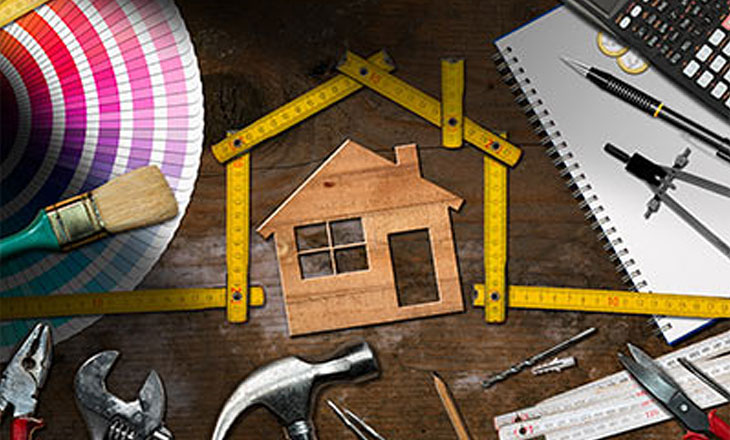A Guide to Financing Your Next Home Improvement Project
By: iTHINK Financial | Feb 03, 2020

Should You Take Out a Loan to Finance Your Home Improvements?
The first question to ask yourself if you are debating taking on a home improvement project is how you plan to pay for it. That starts with determining the total cost of your project by talking to contractors, calculating the cost of supplies and materials, and adding in some wiggle room for the unexpected.
With a number in mind, you’ll need to decide if that sum is one you can save up for or one you’ll need financing help with. A $2,000 front door replacement may be something you can save up for over a few months. Setting money aside for a $15,000 kitchen upgrade would take considerably longer. That’s when a loan or line of credit could come in handy. However, just because you can get a loan doesn’t always mean you should.
When determining if you should take on a loan to fund a home improvement project, the next thing to consider is how the improvements will affect your home’s value. Some renovations recoup over 100% of their cost, meaning when it comes time to sell your home, you’ll be recovering your investment. Other renovations, like kitchen and bathroom upgrades, often only add 70-80% of the money invested in them to a home’s overall value.
On the other hand, a bathroom addition or kitchen appliance upgrade may transform your home life and help you enjoy your home while you are living in it. The value in these projects may not be directly reflected in your home’s selling price, but it may be felt by every member of your household.
If you determine your project will positively impact your home’s value or your home life, a loan or line of credit may be the best way to finance renovations. Before signing any documents, you’ll need to evaluate your finances to ensure you’re able to make payments on the amount you need to borrow to cover your costs. Honesty and transparency is key here—can you truly afford another payment? Will you have to make cuts in other areas of your budget? Answering the tough questions now may save you from biting off more than you can chew when it comes to borrowing.
What’s the Best Loan to Finance Home Improvements?
Once you’ve determined if a loan is the right step for you and your project, you’ll have a few more decisions to make, starting with what kind of loan you take out. Here are options to consider.
Mortgage Refinance
Refinancing your mortgage could help you fund home improvement projects in several ways. First, if interest rates were higher when you first financed your home than they are at the time of your refinance, the lower rate could mean significant savings on your monthly payments, which could go straight into a home improvement fund.
A refinance may also allow you to take out cash by tapping into your home’s equity. With this kind of financing, you would borrow enough to pay off your existing mortgage and keep cash on hand for renovations.
Home Equity Line of Credit
A home equity line of credit, or HELOC, also uses your home’s equity as a way to finance big investments. This loan actually works more like a credit card in that your borrowing limits are set on a revolving basis and only make payments on what you borrow. Once you’re approved, you can borrow as you need it, which makes this kind of financing ideal for projects with longer timelines. You could even use the same HELOC to fund several projects by borrowing and repaying as you go.
Home Equity Loan
Unlike a HELOC, a home equity loan distributes one lump sum which you’ll then make payments on for a set period of time, typically 15 to 30 years. Also, unlike most HELOCs, home equity loans have fixed interest rates, which makes predicting what your payments will be easier than with a variable-rate loan. This kind of loan, versus a home refinance, may be the right choice for you if you already have a low interest rate on your mortgage.
Personal Loans
Instead of using your home’s equity to fund your renovations, you could opt for a personal loan to finance projects. With good credit, lenders may approve you for enough to cover a mid-size renovation at a reasonable rate. Personal loans typically have shorter repayment periods than home loans, but if your project is on the smaller size, they may be worth exploring as an option.
Credit Cards
In most cases, home and personal loans are the best options for those looking to finance a home project. Credit cards are really only a viable option for small home improvement projects as renovations with larger price tags would rack up considerable interest on a credit card. However, if you do have a smaller renovation that you know you can pay back before incurring too much interest, a credit card may offer rewards in terms of points or cash back.
With a better idea of the kinds of funding available for homeowners, you’re one step closer to making your renovation a reality. So, roll up your sleeves and get to work researching rates, terms and finding the perfect plan for you.




